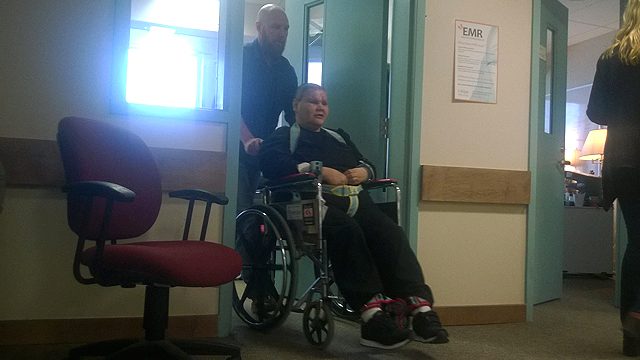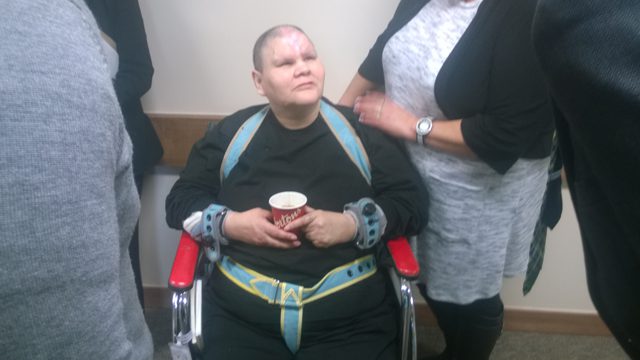Marlene Carter never stood a chance and everyone knew it.
Carter was the first woman to take part in the long-awaited pilot project for female federal inmates with complex mental health problems announced by the former Stephen Harper government in May of 2014.
Only the project was crippled before it began according to the doctor assigned to run it at the Brockville Mental Health Centre.
That’s because the money never followed.
“The answer to your question is there was no pilot project,” said Dr. A. G. Ahmed. “It never got off the ground because the federal government never did it. They didn’t give the funding to get the staff. There was no support to provide the kind of treatment that was expected. Our hands were tied.”
And while Carter, 44, showed initial signs of improvement at the Brockville forensic treatment facility, by the fall of 2014 she fell apart after a series of attacks left staff stabbed and bloodied, hairless, fearful and some crying on their car ride home at night.
There’s still two outstanding charges for attacks against staff and one as recently as Jan. 6.
For the last three months Carter has been restrained in seclusion until the hospital figured out what to do with her.
“The pilot project was a modification of what we said. They gave us two beds. Beds don’t heal people. We don’t have enough staff trained to continue on with the rehabilitation,” said Ahmed. “ It was truncated program. It was a basterdization.”
He said the project was supposed to be three phases – acute treatment and stabilization, that included electro shock therapy, followed by intensive rehabilitation.
“Unfortunately we could never (do rehabilitation). We didn’t have the funding to do that,” he said.
Ahmed made the comments to APTN National News Tuesday while a panel of mental health experts held Carter’s fate in their hands during an Ontario Review Board hearing.
The purpose of the hearing was to decide where to put Carter, a mother of three who has spent the better part of her adult life inside institutions with a slew of complex convictions on inmates and prison staff.
She got nine months for non-violent offences in 1999 but an assault with a weapon on the inside extended her sentence until 2003. She was convicted of several assaults in 2004 on correctional officers and inmates.
She was in an out custody on breaches until 2006. In 2009, she was convicted of several assaults on peace officers and a stranger in the community. She received a 30-month sentence then and further assaults on the inside extended her sentence until now.

Carter was at the meeting, shackled at the feet and restrained to a body brace in a wheelchair. Despite the locks one staff member, who was the victim of one of her assaults, was too scared to walk by her.
Carter has a deep scar down the middle of her forehead from years of bashing it against walls inside prisons.
She had her sister, Peggy Harper, who flew in from Saskatchewan, by her side throughout the proceedings. It was the first time Harper had seen her sister in several years.
“I see all the damage she has gone through and she has inflicted because of all the stuff she went through,” said Harper. “I understand Marlene assaulted a lot people but beyond that they don’t who she is … do they know what she has encountered, the horrific abuse (as a child) she was subjected to and all the restraints? It’s no wonder the way she is.”
Harper said Carter feels like a caged animal.
“I wish I could remove the (restraints) because I know she doesn’t want to attack. She just wants to go home,” said Harper.
During the hearing Carter smiled and whispered to her sister showing a side of her personality which was a far cry from what staff at the institution described.

At one point Harper and Carter began speaking Cree during a break in proceedings.
“I thought if I could speak Cree, because she hasn’t spoken Cree for a long time, it would comfort her,” said Harper.
Based on the recommendations from Carter’s own counsel, Dr. Ahmed and the Crown attorney, the board agreed they would seek to have Carter sent back to a Saskatchewan institution to be closer to her home and family from Onion Lake First Nation.
The problem with sending Carter back to Saskatchewan is that the board is looking to put Carter back in Saskatoon’s Regional Psychiatric Centre, the place she left in 2014 for Brockville. The centre requested many times to have Carter moved.
Staff there found Carter’s mental illness too severe and restrained her for most of the several years she was there to the point her muscles atrophied and she couldn’t stand, let alone walk.
It’s also the same province that has tried twice now to label Carter a dangerous offender, losing the first time in 2014 and abandoning an appeal of that defeat later the same year. Saskatchewan has the highest rates of Aboriginal dangerous offenders in the country. An APTN investigation in 2015 found of all the dangerous offenders, nearly 75 per cent were First Nation, Metis Nation or Inuit. The national average is about 25 per cent.
It is not clear if the province would take Carter back, but if it did, the board is expected to recommend monthly case management updates and cultural healing followed by a review in six months.
Carter’s federal sentence expires later this summer, but even then it’s not clear if she’ll be able to return home.
Kim Pate has known Carter for nearly two decades and is the executive director of the Elizabeth Fry Society that advocates on the behalf of female inmates.
Pate spoke on Carter’s behalf Tuesday, advising the board of what could go wrong if Saskatchewan took a heavy hand on security over the rehabilitation of Carter.
APTN National News asked Pate if she was worried Saskatchewan may try to label Carter a dangerous offender once back in their custody.
“If she’s charged with anything else while in Saskatchewan they could,” she said. “Because the standard is so low now one assault charge, similar to the ones that are being talked about (Tuesday), could be a trigger for a dangerous offender application if the Saskatchewan Attorney General chooses.”
Pate said that is why she recommended to the board there be a strict reporting requirement back to the Ontario Review Board to the manner of how she is being treated and monitored.
“I have known Marlene for many years … the reality is when she is treated with respect, compassion and kindness she responds in a like manner,” said Pate. “The more access she has to her community, family and cultural supports the greater the likelihood she will actually not respond in any kind of violence.”
One of the board members asked Pate during her testimony “have you ever met another Marlene?”
It was the only question the board asked of anyone.
“Yes,” said Pate. “Some are out, some have died, some are still in.”
Ideally, Pate said she’d like to see resources be put in place to allow Carter to return to her community as it was one of the recommendations by the Truth and Reconciliation Commission.
It was the connection to culture that saw Carter stop harming herself while in Brockville said Algonquin elder Albert Dumont who began seeing Carter in Brockville a year ago.
Dumont was able to get Carter clearance to go outside. For the first time in years she walked on the grass barefoot and heard the birds sing, he explained to the board Tuesday. She was also able to smudge outside and he noticed a change in Carter.
He said he picked up on a gentleness that was easy to spot Tuesday within the board hearing and in the hallways of the institution.
APTN spoke to Carter and asked her how she was.
“Secured like this for the last three months,” she said raising her hands up only a bit as they were tied to a brace around her stomach. “I’ve been like this for a long time. I don’t like it. It just makes me want to get back at them more, you know?”
She was able to share a few moments with her sister – They laughed, hugged and cried.
Then she had to go.
A staff member wheeled Carter away who raised her left hand and gently blew her sister a kiss goodbye before disappearing behind a locked door of the institution.
“It’s not easy seeing your own sister like that,” said a tearful Harper. “(But) what I saw today is a bit of hope for her that she won’t be here and closer to home.”










